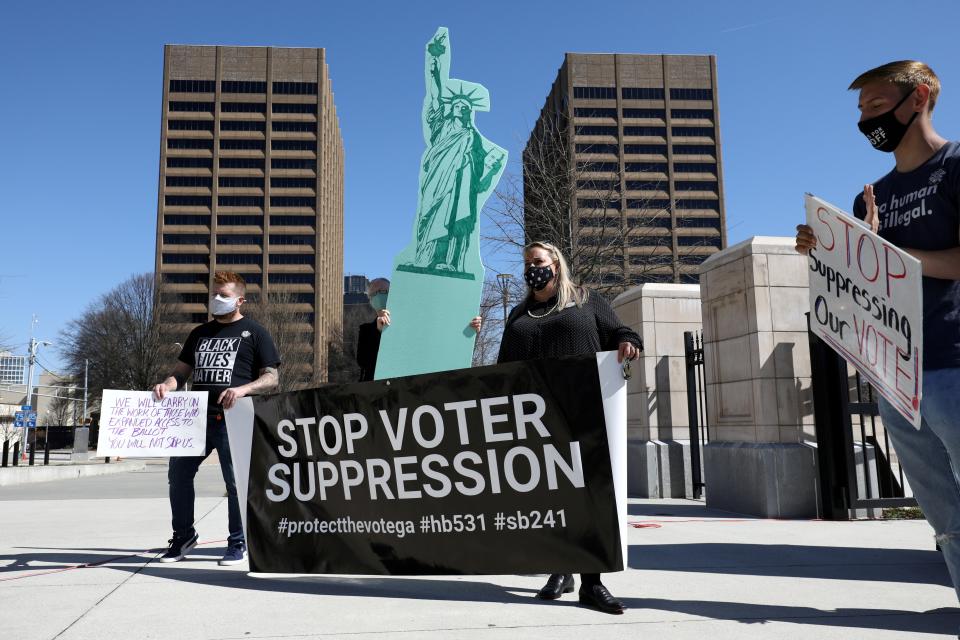148 bills to give GOP lawmakers more power over elections could be ‘death knell’ for democracy, officials warn

While Republican lawmakers and right-wing interest groups mount a nationwide campaign to restrict ballot access, a parallel effort is underway to hand more election authority over to them.
At least 148 bills filed in 36 state legislatures would strip election oversight from election officials and put it into the hands of lawmakers, who would then have authority to disrupt elections and the reporting of the results “beyond any such power they had in 2020 or indeed throughout much of the last century,” according to an extensive analysis from voting rights advocacy groups.
The proposals come after a wave of challenges following 2020 elections, including baseless allegations of widespread voter fraud, conspiracy theories involving ballot manipulation and attempts to undermine and discredit elections and members of both parties who helped run them.
Had the proposed measures been in place last year, “they would have significantly added to the turmoil that surrounded the election, and they would have raised the alarming prospect that the outcome of the presidential election could have been decided contrary to how the people voted,” according to the report from Law Forward, Protect Democracy and States United Democracy Center.
“These are substantial changes that, if enacted, could make elections unworkable, render results far more difficult to finalise, and in the worst-case scenario, allow state legislatures to substitute their preferred candidates for those chosen by the voters,” according to the report. “American democracy relies on the losers of elections respecting the results and participating in a peaceful transition of power. If, instead, the losing party tries to override the will of the voters, that would be the death knell for our system of government.”
Texas lawmakers have filed at least 19 election administration bills in the state, the most among states proposing similar measures, followed by 14 in Georgia and 14 in Arizona – both states where former president Donald Trump and Republicans have sought to throw out results.
Bills in at least three states would give lawmakers the ability to “hijack” results and choose an outcome that doesn’t match the winner of a popular vote in their respective state, the report found.
One measure in Arizona would give the legislature the ability to call itself into session, review county canvasses and send them to the secretary of state’s office. Another measure would call a special session after each regular primary and general election and conduct hearings and receive evidence “relating to any irregularities”.
Another proposal in Arizona would allow the legislature to override the popular vote.
None of those measures appear to be making any progress, though the report says “proposals of this type should be vocally and emphatically rejected”.
At least 16 states have mulled plans to strip election administration from the governor and other offices and place them under the control of the legislature.
In Georgia, the recently passed omnibus elections law replaces the secretary of state as chair of the State Election Board with an official elected by the legislature, among 23 states controlled by Republicans.
It also empowers that board to replace local election officials that have been “called into question”.
Other bills in battleground states would allow legislatures to “micromanage” elections, from maintaining voter rolls to checking election equipment at voting precincts, raising the “prospect of unmediated conflicts between traditional executive branch election administrators and the legislature”, the report found.
“These bills fly in the face of our history, in the face of public opinion, and against the will of the people,” said Joanna Lydgate, national director with the Voter Protection Program, during a press conference unveiling the report on Thursday.
The justification for the measures comes out of the persistent lies of election fraud promoted by the former president, said Jess Marsden, counsel with Protect Democracy.
“It’s not a surprise we see the largest number of bills filed in … hotspots for unfounded election challenges in 2020,” she said.
Michigan Secretary of State Jocelyn Benson – who oversaw record turnout in her state during November’s general election – said that “conspiracy theories and the big lie are manifesting themselves in the legislation and directives undoing the very policies that were so successful in 2020.”
“I’m fed up,” she said. “We had one of the most successful elections in our state and country’s history. Not only are we not celebrating that, we’re trying to tie the hands of those who worked so hard in the midst of a pandemic to make sure more people could vote than ever before. That’s unconscionable.”
The proposals are being filed – or in some states, signed into law – while legislators consider dozens of bills in nearly every state that would roll back vote-by-mail options, impose strict voter ID requirements, cut back on early voting hours and put in place other obstacles that would make it more difficult, not easier, to vote.
At the same time, more than 800 bills in at least 47 states would expand voting access, according to the Brennan Center for Justice.
Of those bills, nine have been signed into law, while 112 bills in 31 states are moving through state legislatures and are awaiting governors’ signatures.
Secretary Benson said states must approach election laws using the same facts and data, respect the expertise of elections officials, and recognise that “running elections is not about determining or ensuring any particular entity or group wins but doing what’s best for all voters.”
“If we can push leaders in that way … we can move forward out of this moment in a way that protects our democracy,” she said. “We all have to be vigilant.”
Read More
Can you tell the difference between an inkblot and a gerrymandered congressional district?

 Yahoo Movies
Yahoo Movies 